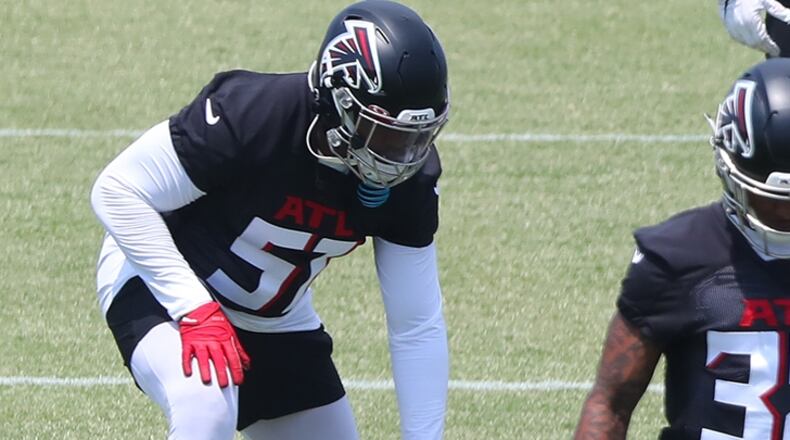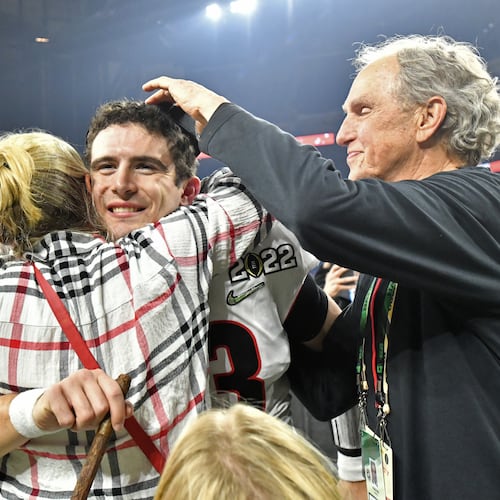Before he arrived as the Merrill and the Lynch of the Falcons’ locker room, linebacker Brandon Copeland already had proved to have an innate ability to recognize, and then seize, a golden opportunity.
You could say the story of how Copeland won over his wife is an allegory for both shrewd investing and for successful linebacker play. Complete with useful football terminology.
To begin, he met Taylor his first day at college – Penn – and they connected. But there was a complication. He picks up the story:
“She had a boyfriend from high school, and they stayed together all through college. We became best friends. But about a year and a half after college he messed up.
“And I,” he said with wry smile affixed, “scooped and scored.”
Touchdown. In November, the Copelands are expecting their second child. Both Ivy League grads, they make a formidable couple.
She an executive at Google with a title so heavy she has to pay a little extra to check it at the airport baggage counter: Creative Lab Finance, Strategy and Operations Manager.
And he a one-time undrafted free agent who eventually escaped practice-squad limbo, is beginning his sixth season with his fourth different team as a plug-in defender and special teamer and who just sneaked under the wire to be recognized as one of the special “30 Under 30 Class of 2021” in sports by Forbes Magazine. He turned 30 on July 2.
The Falcons, whose new leadership became acquainted with Copeland during some extended practice-squad time in Tennessee, signed him in the offseason to a one-year free-agent deal. His job is not to exchange entrepreneurial ideas with Arthur Blank – although the graduate of Penn’s Wharton School of business would be comfortable with the conversation. Rather, he’s meant to add depth to what figures to be the stoutest position group on the Falcons’ defense.
(And it has to be the only position group in the NFL featuring two Ivy Leaguers – Copeland and Foye Oluokun out of Yale).
There is little question Copeland has done well with this football thing. Each year at his youth football camp, he spreads out a long roll of paper marked from one to 80, representing an average lifespan. In black marker, he blocks off a sliver of that time, 3½ years, representing the average length of an NFL career.
It’s a powerful visual aid to an important point. “Don’t tell me that the only thing you’re interested in for all that time is just football,” he said. “You have to be interested in something else. You might chase those passions the way I do, but ultimately, it’s OK to get your head out of a playbook and read a book.”
He already has defied that timeline by extending his football life now into his 30s. But that’s not the reason Copeland got special notice from Forbes and has become a contributor to the business publication Kiplinger – latest entry, “The Real Cost of Buying a Home.” Rather, it’s how he is able to springboard so effortlessly from football into the deep end of personal finance.
His is a most rare combination. Imagine “Mad Money” host Jim Cramer, only at 6-foot-3, 255 pounds and capable of running a 4.6 40.
Oh, and imagine Cramer’s primary job being so punishing that he has torn both large muscles on each side of his chest. Copeland’s done that, the second time last year, which cost him the rest of the season after having started in four of New England’s first six games.
Copeland early seized upon the idea that he needed to diversify, not rely solely on football. Solid thinking for any pro, but especially for an undrafted free agent. He’d use that Penn education, the platform of being an NFL player and the contacts he made along the way to build security while working in a most insecure profession.
First tip: Don’t be one of those young locker-room cliches who burn through all their new-found money on the pyre of idle pleasure. Copeland says he still lives on a small fraction of his income, investing the rest. Now he is a partner in a couple of real estate development firms, one just completing two affordable housing projects in Newark, N.J.
“It’s a habit,” he said. “I’d rather put my money in something that can make me money than spend it on something I’m going to grow out of in 2-3 years anyway.” Thus, he says he still drives the car he bought for $30,000 in 2016.
He would describe his investing style as smartly aggressive. “I have a conservative bucket, I try to make sure my assets are tied up in things I understand as much of the risk as much as possible,” he said. “But ultimately, I didn’t get here playing it safe. I tell my wife all the time I don’t think God got us here to take our foot off the gas pedal now. For me it’s about smart, calculated risk.”
It’s an idea he’s evangelistic about. He has led a “Money Talks” webinar series for fellow NFL players. And as Copeland wrapped up another day of training camp Tuesday, he was preparing for his latest session of the online course he leads – Life 101. It’s a concept he’d like to take into the high schools, imparting a measure of financial literacy.
Of most concern to the Falcons is the biggest investment Copeland made this offseason – in himself. “The most I’ve ever invested in my body in the offseason – my training and recovery process and everything like that,” he said.
And as he competes in camp for an important role on the Falcons’ defense, he does so with one clear advantage.
“Financial freedom is being able to do what I want when I want. And clearly I have one of the greatest jobs in the world – the best job in the world in my opinion. I love every single day of it. Ultimately financial freedom allows me to play freer.”
But, he added, “I always said my safety net wasn’t always my portfolio or my investments. It’s more my village. An amazing wife. An amazing mother. They’ve all lifted me to be here. Regardless if I fail at this, for whatever reason, I’ve won.”
About the Author
The Latest
Featured



